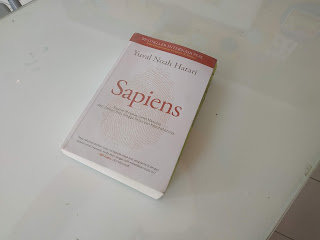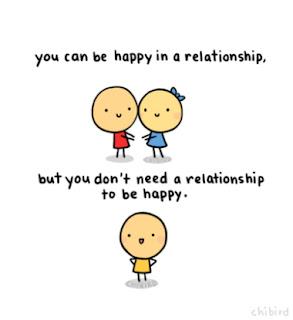Sapien Reviw by Yuval Noah Harari
The book comprises four sub titles regarding sapiens’
main stages from when they start creating social culture to a prediction and
probability of how far Sapien could go with their science and advanced
technology in the future. Starting the book, the author explained a concise
pre-historic life of how Sapiens survived and won the battle against their
relatives for dominance; Homo Rudolfensis, Homo Erectus, and their biggest
competitor Homo Naenderthal; and migrated all over the word by hybridization.
The
cognitive revolution was marked by how Sapiens’ communication widely evolved to
something bigger both in quality and quantity. For our foraging ancestors,
communication was used to be functioned to merely inform their surroundings, and
it was used to limited people in the community before it evolved in
quantity—that Sapien could enunciate more information and thus they gain more
people in the community. In quality, their communication developed to inform
things beyond their senses could perceive, things that aren’t real—things what
Harari called as fiction and imagined reality. One thing interests me from this
chapter was that how powerful gossiping was in developing their communication
scope; hence it gave the path to their successors on creating a lot of fiction
and imagined reality from it.
As the defining leap, the agricultural revolution was the transition from Sapiens’ natural traits as hunter-gatherers to be settlers who then resided in one place to another place for some period, to eventually stayed in some specific place for a long period—if not forever. His most striking and noticeable argument here was about the differences between hunter-gatherers and agricultural people. He believe that we were trapped in agricultural civilization, and it was the biggest fraud in human history, he said. He pointed out that what makes us different from other animals was because of our ability to cooperate both flexibly and in very large numbers so we were eventually able to dominate the world. In other words, humans' individual survival skill is behind other animals’ level.
For Harari, our foraging ancestors had got this as-good-as-other-animals individual level of insight and survival skill than us, modern Sapien. Even though we invented technology, found a way to cure disease, create music, etc, but those all are because of our power in collective levels. Not all of us have those superior skills, while our foraging ancestors are mostly skillful at the things they had to learn--in order to deal with the harsh and though of hunter-gatherers life. They mostly understand nature better and have a good insight upon everything around them. They could do their work on their own without always asking others to help. Now, look at us, we need teacher to teach us, doctor to cure us, barber to cut our hair, you name it. Feel inferior enough?
In chapter three, The Unification of Humankind, the book talks about how imagined reality became widely used to construct culture and civilization. Harari thoroughly explained the three biggest imagined reality that finally came to unify people with the same belief; the belief in money, empire, and religion.
Belief in money came from the collective agreement in resolving the problem of bartering goods that causes people in confusion; the value of the goods needs to be adjusted anytime they want to barter what they have with what they need. Moreover, it’s not that simple since the barterers must come to an agreement that they both need the goods or services the other one offer. If they didn’t then it would not proceed, and the market wasn’t developed. There, money was created and problem solved. It slowly spread that people around the world come to believe this fiction in their minds because others, also do. That’s how imagined reality worked to unify people as it went to empire and religion. Roman Empire, the Islamic Caliphate Empire and European Empire are the greatest three that he explained in this book.
As for religion, Harari explained how it went bigger from the belief of objects, places and animal called as animism, multi-gods (polytheism), two supreme opposed powers or Gods (dualism) to eventually believe in single God (monotheism) as what Christian and Islam came up with. Unlike religion and empire that had a limited scope or area, money was the biggest imagined reality that unifies people all over the world without exception.
The last chapter is the Scientific Revolution, which we all could guess what it talked about. The chapter seems less interesting to me among the other three, for it started quite well but then it went downhill when he brought up happiness and such. It’s just too imaginary and blurry to compare the happiness modern Sapien feel to what their foraging ancestors did. It firstly discussed improvement in the field of science and how they work on something that is now believed theoretically possible but sounds impossible to make it happen such as Gilgamesh project coming from Gilgamesh myth that takes the idea of living an eternal life to discussing of how capitalism took over science.
Declaring as a brief history of humankind to this 500s pages book sounds implausible. But Sapien came to the table with interesting discussion. This book’s not providing a deep talking with the thorough explanation; it might look like a trivia about humankind to some people instead. But Harari ingeniously wrapped those trivia in a felicitous package.
As the defining leap, the agricultural revolution was the transition from Sapiens’ natural traits as hunter-gatherers to be settlers who then resided in one place to another place for some period, to eventually stayed in some specific place for a long period—if not forever. His most striking and noticeable argument here was about the differences between hunter-gatherers and agricultural people. He believe that we were trapped in agricultural civilization, and it was the biggest fraud in human history, he said. He pointed out that what makes us different from other animals was because of our ability to cooperate both flexibly and in very large numbers so we were eventually able to dominate the world. In other words, humans' individual survival skill is behind other animals’ level.
For Harari, our foraging ancestors had got this as-good-as-other-animals individual level of insight and survival skill than us, modern Sapien. Even though we invented technology, found a way to cure disease, create music, etc, but those all are because of our power in collective levels. Not all of us have those superior skills, while our foraging ancestors are mostly skillful at the things they had to learn--in order to deal with the harsh and though of hunter-gatherers life. They mostly understand nature better and have a good insight upon everything around them. They could do their work on their own without always asking others to help. Now, look at us, we need teacher to teach us, doctor to cure us, barber to cut our hair, you name it. Feel inferior enough?
In chapter three, The Unification of Humankind, the book talks about how imagined reality became widely used to construct culture and civilization. Harari thoroughly explained the three biggest imagined reality that finally came to unify people with the same belief; the belief in money, empire, and religion.
Belief in money came from the collective agreement in resolving the problem of bartering goods that causes people in confusion; the value of the goods needs to be adjusted anytime they want to barter what they have with what they need. Moreover, it’s not that simple since the barterers must come to an agreement that they both need the goods or services the other one offer. If they didn’t then it would not proceed, and the market wasn’t developed. There, money was created and problem solved. It slowly spread that people around the world come to believe this fiction in their minds because others, also do. That’s how imagined reality worked to unify people as it went to empire and religion. Roman Empire, the Islamic Caliphate Empire and European Empire are the greatest three that he explained in this book.
As for religion, Harari explained how it went bigger from the belief of objects, places and animal called as animism, multi-gods (polytheism), two supreme opposed powers or Gods (dualism) to eventually believe in single God (monotheism) as what Christian and Islam came up with. Unlike religion and empire that had a limited scope or area, money was the biggest imagined reality that unifies people all over the world without exception.
The last chapter is the Scientific Revolution, which we all could guess what it talked about. The chapter seems less interesting to me among the other three, for it started quite well but then it went downhill when he brought up happiness and such. It’s just too imaginary and blurry to compare the happiness modern Sapien feel to what their foraging ancestors did. It firstly discussed improvement in the field of science and how they work on something that is now believed theoretically possible but sounds impossible to make it happen such as Gilgamesh project coming from Gilgamesh myth that takes the idea of living an eternal life to discussing of how capitalism took over science.
Declaring as a brief history of humankind to this 500s pages book sounds implausible. But Sapien came to the table with interesting discussion. This book’s not providing a deep talking with the thorough explanation; it might look like a trivia about humankind to some people instead. But Harari ingeniously wrapped those trivia in a felicitous package.
Many of his points of view regarding
hunter-gatherers life and how he claimed agricultural revolution as the biggest
fraud on human history seem a bit
fictitious, i'd say to be frank. Rather than providing a bunch of scholarly
research, he instead enjoyed explaining his personal bias and put it in a way
as if it is objective facts. It is quite odd and I found myself disagree many
times, but that’s what makes it interesting. I enjoy this book so much instead.
His point of view makes his book boomed and went worldwide. He provided some
interesting facts felicitously to support his view and it makes me enjoy every
single page as though I read a page-turner fiction novel. And, to wrap up this
review, I have to agree that we humans are a selfish creature.



Komentar
Posting Komentar
Bercuap here!